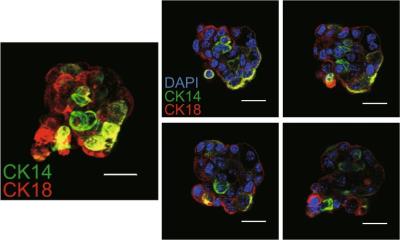Image source: Adobe Stock/Crystal light
News • Insights into stem cell behaviour
Breast cancer: new mechanism of drug resistance discovered
Scientists from Università Cattolica in Rome, together with colleagues from the IIGM Foundation (part of Candiolo Institute at Turin), have discovered a new drug-resistance mechanism in breast cancer that leads to the formation of cancer stem cells, (the cells that feed the tumor and cause relapse and metastasis).
They have also devised an experimental therapy to bypass or prevent the emergence of drug-resistance. The results are published in Nature Immunology. The research was coordinated by Antonella Sistigu and Martina Musella, Department of Translational Medicine and Surgery, section of General Pathology and Clinical Pathology directed by Professor Ruggero De Maria and Ilio Vitale of the IIGM Foundation—Italian Institute for Genomic Medicine (part of the Compagnia di San Paolo Foundation), at Candiolo Institute, FPO-IRCCS, Candiolo (Turin).
Paradoxically, some of these alarmins, such as type I interferons, can reprogram residual cancer cells and transform them into cancer stem cells
Antonella Sistigu
The scientists discovered how the tumor evolves during treatment and develops resistance to therapies. "More specifically," Sistigu and Musella explain, "we have demonstrated that some tumor cells, while dying as result of chemotherapy, release in the tumor microenvironment a group of factors called 'alarmins,' which, normally alert and activate the immune system. However, paradoxically, some of these alarmins, such as type I interferons, can reprogram residual cancer cells and transform them into cancer stem cells, the deadly reservoir of the tumor. These stem cells are responsible, for example, for disease recurrence and metastasis."
Cancer stem cells escape the control of the immune system and have high invasive and aggressive potential. The scientists have discovered that this mechanism of drug resistance depends on activation of a protein called "KDM1B". KDM1B controls and regulates gene expression. After the discovery in animal models, Ilio Vitale explains, "we studied 5 different cohorts of patients and confirmed that this mechanism is valid also in patients."
Finally in laboratory experiments the scientists saw that inhibition of KDM1B prevented cancer stem cells formation and increased the effectiveness of therapy. "Based on these results we propose a combination therapy (some specific chemotherapeutics and immunotherapeutics, together with the experimental drug that inhibits KDM1B, to prevent formation and possibly effectively target this subpopulation of stem cells otherwise resistant to any treatment," the researchers say.
The next step of this research will be to evaluate the combination therapy in trial clinic on patients, Sistigu concludes.
Source: Universita Cattolica del Sacro Cuore
07.10.2022











